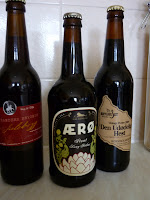Weights and Measures Act 1985

It comes up every so often doesn't it, these arguments about pub measures and whether they should be standardised or not? We had this many years ago on Usenet where it got rather heated. More recently, Mark Dredge was on about it, though his concerns seem more to do with with needing smaller measures for his beloved strong beer. (In fairness, he would I think be happy to see wider use of the legal third pint measure.) Beer Nut too seemingly has a leaning towards metric rather than imperial and is keen to urge his Irish compatriots to abandon their traditional pints and half pints for more European measures. (He'll correct me if I'm wrong). I doubt if they will though, as European subsidies for such trivialities are no longer available. Woolly Dave also dabbles in this subject on the side of the reformists.
So what are the arguments? Well on one side you have a certainty with standardised measures. It enables direct comparison, allows you to know what to expect and to have redress if you feel cheated in some way. You can clearly measure your alcohol intake without tedious addition. It commands in the UK, considerable public support and you have valuable protection in law. On the other hand why shouldn't a pub be able to decide how much it charges for a measure it decides? Well, nailing my colours firmly to the mast, for the answer, see above and below.
One mustn't forget why measures were brought in in the first place. They were to prevent exploitation by the unscrupulous. If you go to many medieval German towns you will often see on the market place, iron sets against which a loaf could be measured, because bakers cheated their customers.These date back many hundreds of years and weren't brought in because of a love of regulation, but rather, because people were being being short changed and made a fuss about it. It isn't for reasons of altruism that in America, where no such regulation exists, that when the standard 16oz US pint is eschewed, it is usually in favour of a 14oz pour. These aren't known as "cheater pints" for nothing and are made with thicker glass bottoms to give a contrary impression to what they actually are.
My problem with this is I don't see where the advantage to me as a drinker would come in change, so, having put my position clearly, I'll throw it open and ask this basic question:
What advantage would changing the current regulations on liquid measure have and for whom?"










































